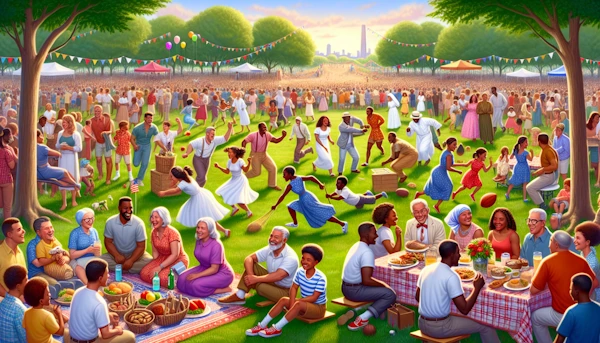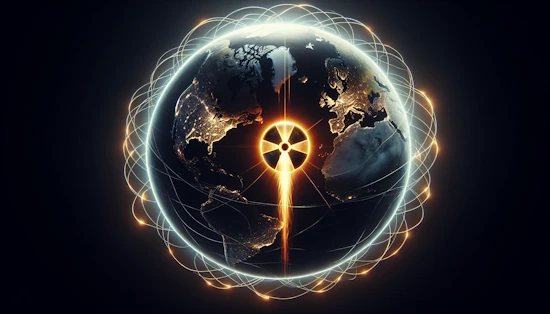
What is Juneteenth? This question marks the entry point into an essential and profound segment of American history, encapsulated within a holiday that represents much more than a date on the calendar. June 19th, or Juneteenth, stands as a symbolic day of freedom and liberation, commemorating the end of slavery in the United States. Its origins trace back to Texas in 1865, when Union soldiers landed at Galveston, bringing with them the news of the Emancipation Proclamation by President Lincoln, which had officially outlawed slavery two and a half years earlier. This pivotal moment not only altered the course of American history but also signified a promise of equality, unity, and liberty, making it a cornerstone for community reflection, education, and reconciliation.
The article delves into the rich tapestry of Juneteenth, beginning with its historical background, exploring the evolution from a regional celebration in Texas to a nationwide holiday marked by a variety of traditions and meanings. It examines the significance of Juneteenth in modern America, highlighting how the holiday serves as a focal point for addressing systemic racism, celebrating cultural heritage, and promoting diversity and inclusion. The narrative further outlines how Juneteenth is celebrated across the country, illustrating the ways in which these celebrations foster a sense of community and national independence, while also being a vehicle for education on Black history and the ongoing struggle for equality. Additionally, the impact of Juneteenth on the African American community is discussed, presenting it as a time for both celebration and solemn reflection on the long journey toward true liberation and reconciliation. Through this exploration, the article aims to offer a comprehensive understanding of Juneteenth’s lasting influence on American history and its vital role in the narrative of freedom and equality.
The Historical Background of Juneteenth
On the eve of January 1, 1863, a significant event known as “Freedom’s Eve” unfolded across the United States. Enslaved and free African Americans congregated in churches and homes, eagerly anticipating the enforcement of the Emancipation Proclamation. As midnight struck, the proclamation took effect, declaring all enslaved individuals in Confederate states legally free. Union soldiers, including many African Americans, played a crucial role in disseminating this news, marching across southern cities and plantations with copies of the proclamation.
However, the full realization of freedom was not immediate. The Thirteenth Amendment, ratified later, was necessary to abolish slavery across the entire United States. It wasn’t until June 19, 1865, when Union troops arrived in Galveston Bay, Texas, that the emancipation of over 250,000 enslaved black individuals in Texas was announced. This day, now celebrated as Juneteenth, marked a significant moment in American history, symbolizing true liberation for many African Americans.
The period following emancipation, known as Reconstruction (1865-1877), was a time of great hope but also profound struggle. Formerly enslaved individuals endeavored to reunite families, establish educational institutions, engage in politics, and advocate for transformative legislation. Despite these efforts, the journey toward equality and justice was fraught with challenges. The legacy of Juneteenth, as highlighted by the National Museum of African American History and Culture, serves as a testament to the enduring spirit of hope and resilience in the face of adversity.
Juneteenth’s significance extends beyond its historical context; it acts as a reminder of the ongoing struggle for civil rights and the importance of achieving true equality in America. As such, it is celebrated not only as a day of freedom but also as an opportunity for reflection and continued advocacy for justice.
Significance of Juneteenth in Modern America
Federal Holiday Recognition
Juneteenth, officially known as Juneteenth National Independence Day, was designated as a federal holiday on June 17, 2021. This significant act was the culmination of years of advocacy, notably by figures such as Opal Lee, who is affectionately known as the “grandmother of Juneteenth”. Her efforts, alongside widespread support from various communities and leaders, led to the rapid passage of the bill through Congress. The holiday now serves as a vital reminder of the long and tumultuous journey towards freedom for African Americans, marking a pivotal moment in the nation’s history. It is the first federal holiday established since Martin Luther King Jr. Day was recognized in 1983, highlighting its importance in acknowledging Black Americans’ contributions and struggles.
State-Level Observances
At the state level, the recognition of Juneteenth varies considerably, reflecting the diverse approaches to commemorating this important day across the United States. As of recent reports, at least 28 states along with the District of Columbia recognize Juneteenth as a public holiday, ensuring state offices are closed and state employees receive a paid day off. States like Texas, where Juneteenth has its origins, have recognized the day as a state holiday since 1980, long before its federal acknowledgment. Other states, including New Mexico and Illinois, have more recently declared it a paid holiday for state workers, reflecting a growing acknowledgment of its significance.
The observance of Juneteenth at the state level often involves a variety of celebrations and educational events that aim to highlight the history and cultural heritage of African Americans. These state-level recognitions not only commemorate the end of slavery but also encourage ongoing reflection and dialogue about the current social, economic, and political issues facing the African American community today.
How Juneteenth is Celebrated
Traditional Celebrations
Juneteenth, an annual commemoration of the end of slavery in the United States, has deep roots in African American history. Celebrations of this significant day date back to the late 1800s, originating in Galveston, Texas. It marks the moment in 1865 when enslaved people learned of their freedom, a full two years after President Abraham Lincoln’s Emancipation Proclamation. Traditionally, Juneteenth festivities have centered around outdoor gatherings such as cookouts and barbecues, which allowed for large reunions among formerly enslaved families. These gatherings were not only celebratory but also acts of resistance against oppressive “Black Codes” that restricted the lives of freed slaves. Food plays a central role in these celebrations, with a particular emphasis on red foods which symbolize the bloodshed and sacrifice of enslaved ancestors. Typical dishes include barbecued ribs, watermelon, and red velvet cake, accompanied by drinks like red fruit punch and Kool-Aid.
Modern Events
In recent years, the recognition and celebration of Juneteenth have seen a resurgence, particularly following the nationwide protests in 2020. This renewed interest led to its designation as a federal holiday in 2021. Today, Juneteenth is celebrated with a variety of events that both honor the historical significance and promote the ongoing struggle for equality. Modern celebrations include educational panels, community service activities, and virtual experiences that explore significant historical sites and stories. For instance, virtual tours in places like Hampton, VA offer insights into the lives of figures such as Harriet Tubman and John Brown, providing a deeper understanding of the holiday’s historical context.
Corporate America has also embraced the holiday, with many companies organizing team-building activities that focus on education and appreciation of Black history. These activities often include trivia games about African American changemakers, virtual field trips to significant cultural sites, and interactive sessions that highlight the contributions of Black leaders throughout history. Additionally, many businesses support local Black-owned businesses and charities, further enriching the community’s engagement with the holiday.
Juneteenth serves as a day of reflection and celebration, emphasizing African American resilience and achievement. Whether through traditional gatherings or modern educational events, it remains a vital time for recognizing the journey towards freedom and equality in America.
Impact of Juneteenth on the African American Community
Cultural Significance
Juneteenth holds a profound place in the African American narrative, symbolizing not only the end of slavery but also the enduring quest for freedom and equality. It serves as a poignant reminder of the struggles endured and the achievements made by African Americans. This day places Black people at the center of the conversation about freedom, its meaning, and its manifestation in the nation. Unlike the fixed historical context of July 4th, Juneteenth is perceived as a fluid and adaptable event, always relevant to the continuous fight for civil rights. It is a day that resonates with the African American community, providing a platform for reflection on past adversities and ongoing challenges.
The celebration of Juneteenth is not just a recall of historical events; it’s a vibrant cultural expression that includes parades, singing of spirituals, and family reunions. These gatherings are not only acts of remembrance but also affirmations of Black culture and achievements. The symbolism of red foods, representing the blood and sacrifice of ancestors, and the spirited gatherings underscore a collective identity and a shared history of resilience.
Educational Importance
Juneteenth also plays a crucial role in education about Black history and the ongoing issues of racial equality. It acts as a rallying call to think about the broader implications of freedom, especially in the context of educational equity and systemic barriers. This observance is a chance to highlight the importance of creating learning environments that enable all learners, particularly African Americans, to achieve their fullest potential. By decentering whiteness in teaching and learning, and addressing structural barriers in educational policies, Juneteenth encourages a reevaluation of how history is taught and understood.
The day is particularly significant in bringing political awareness and civic engagement to the forefront. It emphasizes the importance of being informed about local and national issues, registering to vote, and participating actively in the democratic process. Educational events during Juneteenth provide opportunities for the community to learn about their rights and responsibilities, ensuring that the lessons of history are not only remembered but acted upon.
Through various educational platforms, whether formal or informal, Juneteenth facilitates the transmission of crucial historical and cultural knowledge. It provides a space, both physical and metaphorical, for African Americans to explore their history, celebrate their culture, and advocate for their rights, ensuring that the legacy of Juneteenth continues to inspire and educate future generations.
Conclusion
Reflecting on the narratives and insights presented, the exploration of Juneteenth has illuminated its pivotal role in American history and culture, encapsulating a journey from the darkest days of slavery to a beacon of hope and liberation. This commemoration, echoing through the generations, serves not just as a remembrance of emancipation but as a vibrant celebration of African American resilience and contributions to the fabric of the nation. The significance of Juneteenth transcends its historical origins, evolving into a symbol of the ongoing pursuit of equality and justice, deeply ingrained in the collective conscience of the community and the broader society.
As we conclude, it is clear that Juneteenth is more than a historical footnote; it is a living testament to the strength and perseverance of the African American spirit. The federal recognition and the varied observances across states underscore the collective acknowledgment and respect for this day, fostering a deeper understanding and appreciation for the complexities of freedom and equality. It prompts us to reflect on our shared history, encourages continuous education, and inspires a renewed commitment to fostering a more inclusive and equitable future for all. Juneteenth stands as a day of reflection, celebration, and education, urging us to carry forward the lessons of the past as we pave the way for future generations.
FAQs
1. What is the significance of Juneteenth in American history?
Juneteenth marks a pivotal moment in American history as it commemorates the day — June 19, 1865 — when approximately 2,000 Union troops arrived in Galveston Bay, Texas, and declared that over 250,000 enslaved African Americans were free by executive decree. This historic day is celebrated as Juneteenth, symbolizing a major step towards the end of slavery in the United States.
2. How do people observe Juneteenth in modern times?
Juneteenth is celebrated with a variety of events and activities today. These include prayer and religious services, educational events aimed at discussing the historical context and significance of the day, family gatherings, picnics, and larger community festivals featuring music, food, and dancing.
3. What impact did the civil rights movement have on the celebration of Juneteenth?
During the 1960s, the prominence of Juneteenth celebrations waned as the civil rights movement took center stage. However, the holiday regained its significance in 1968 following the Poor People’s Campaign’s decision to commemorate Juneteenth Solidarity Day, an initiative that was initially led by Martin Luther King, Jr.
4. What is the general opinion of Americans on recognizing Juneteenth as a national holiday?
There is mixed sentiment among Americans regarding Juneteenth being recognized as a federal holiday. About 35% support the idea, while 25% oppose it, and 40% remain unsure. Notably, 28% of U.S. adults admit to having no knowledge of the holiday, reflecting a varied level of awareness and support across the country.







